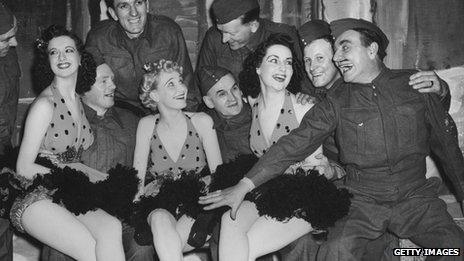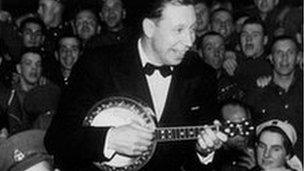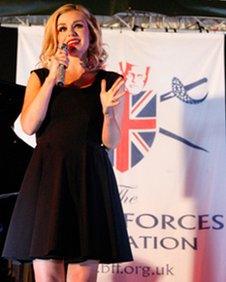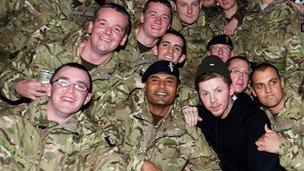The psychology behind war-time entertainers
- Published

British troops meet The Ascots in 1940
Entertaining the troops has long been seen as a vital and necessary way of boosting the morale of armed forces stationed overseas.
New research from King's College London, external suggests that it may even play a role in protecting service personnel against mental health problems.
From Harry Lauder to Gracie Fields and Vera Lynn, the UK's biggest stars have performed in front of thousands of service men and women during two world wars.
In recent times, Katherine Jenkins, James Blunt and comedian Jim Davidson have all held shows in frontline areas of Afghanistan, Iraq and Kosovo.
Mark Cann, chief executive of the charity British Forces Foundation, said historically entertainment has always been important.
'People care'
"It's a little bit of back home. It breaks the routine, the monotony and gives time for reflection and enjoyment," he said.

George Formby was a troops' favourite, performing here in 1939
Cann said celebrities are often a pure connection between those serving on the front line and the public back home.
"It's the message behind the entertainment that has the lasting impact. People do care that the big star is giving up their time for nothing. That means a lot."
Jenny Hyatt of Big White Wall, a support network for military personnel and their families, said while celebrities can give confidence to troops by being in the battlezone with them, they could also cause morale to slip.
"It's important for troops to be realistic about the situation they are in. There is a danger of over-identifying with the glory rather than the daily management of psychological needs."
Under fire
During WWI, boosting morale presented considerable problems.
At the start of the conflict, major actors and singers rarely travelled to France, where troops were engaged in mentally and physically exhausting trench warfare.
Instead, they focused on raising spirits when troops returned to the UK.
But one exception was Harry Lauder, a leading music hall artiste.
"He was the first big celebrity to entertain the troops by going to the front line," said Edgar Jones, professor of the history of medicine at King's College London.
"And it had more personal meaning because his son had been killed in action in 1916."
On one occasion, a concert Lauder was giving on the battlefield had to be abandoned when his trench came under fire.

Katherine Jenkins, a British Forces Foundation trustee, sings to 1 Rifles
Despite a lack of research into the value of the entertainment provided to servicemen during WWI, it is hard to imagine it could have been anything other than a major morale-boost during such a terrible conflict.
Psychological link
By the time of the WWII, Professor Jones says morale was considered a priority - so much so that a special committee was set up by the War Office in 1942 to monitor morale at home and overseas.
In his new report into the morale and psychological wellbeing of the UK's armed forces, Prof Jones says studies show that as morale falls, psychological disorders rise.
And it makes troops less effective too.
"Morale is so important. It drives what you do and the way you do it. When morale falls off you lose determination, and that's contagious," he said
He acknowledged that no single factor can be guaranteed to raise morale.
"But those that do will undoubtedly have some effect on mental wellbeing. Whilst entertainment cannot and does not provide absolute protection against the psychological problems associated with war, it does have a role to play in protecting against mental health problems."
Anecdotal reports from WWII suggest that high-quality shows engaged at an emotional level and left a strong and lasting impression.
Gracie Fields, then the UK's biggest star, appealed to the troops and the factory workers because they could relate to her working class background and adored her powerful performances.
Joyce Grenfell and Noel Coward, among others, gave willingly of their time to perform unpaid concerts on lengthy tours of camps, factories and battlefields.
Severe stress
By the time the UK's armed forces were deployed to Afghanistan in 2002, entertainment was seen as one important way of sustaining morale among service personnel, nearly half of whom were aged under 27.

Rap star Professor Green with the 7 Armoured Brigade in 2011
Prof Jones said a study undertaken in January and February 2010, found that around 70% of troops reported high levels of unit cohesion, and this was associated with having better mental health.
The report also found that the increased risks encountered in forward operating bases and patrol bases in Afghanistan were off-set by morale and esprit de corps.
Yet, psychological problems and severe stress are not unavoidable, especially for those who have been on multiple tours to the region.
The charity Combat Stress say that rates of post traumatic stress disorder in personnel who served in Iraq and Afghanistan are around 4%.
The King's College London study says this increases to 7% for UK frontline troops in Afghanistan.
US forces experience higher rates of post-traumatic stress disorder - 13% - due to longer tours of duty, and the use of reservists of a younger age.
"Maintenance of morale is the second principle of war," says Mark Cann, of the British Forces Foundation (BFF).
BFF has organised big names like rap star Professor Green, Radio 1 DJ Tim Westwood and comedians Joe Pasquale and Jimmy Carr to perform for UK troops abroad.
But the entertainment has to be high quality, tailored to a military audience and delivered to troops on the frontline as well as in other areas, Cann says.
Experts agree that more research is needed to assess the impact of entertainment on morale and how long its effect might last.
But whether it is Katherine Jenkins, David Beckham or Winston Churchill in 1942, their visits have all given combat troops a lift at a particularly challenging time.
- Published11 November 2011
- Published5 December 2011
- Published11 March 2011